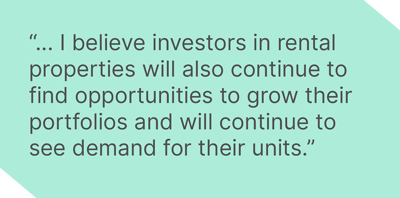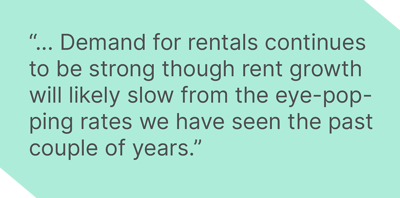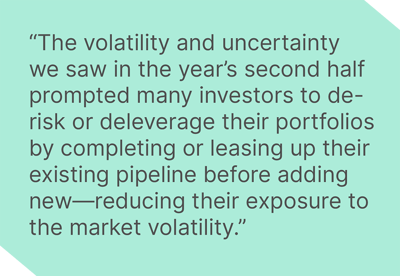
Real Estate Investors Move into 2023 with Fresh Momentum
A new year is upon us, and with it comes the opportunity to put 2022 behind us and move into 2023 with fresh momentum. As you look at your real estate investment goals for the new year, it's vital to peek ahead cautiously because housing market conditions can change rapidly from month to month.
We recently sat down for a Q&A with Stephanie Casper, Chief Revenue Officer of Kiavi, to learn more about what might be coming for the real estate market in 2023.
2022 was a rollercoaster year for real estate investors. How do you think 2023 will change?
2022 was almost a tale of two years. The front half of the year was marked by low rates and a hot housing market, really a seller's market with demand driving continued home price increases. With the Fed's actions and rapid rise in rates, the second half of the year was marked by a significant cooling off and home price declines in many markets.
I see 2023 as less volatile. I believe that we have all digested the interest rate changes and adjusted to this new norm. Higher rates are here to stay—meaning fewer homeowners are incentivized to sell because they have historically low interest rates on their current homes. This will likely result in fewer transactions, fewer buyers and a continued cooling of home prices—which, unfortunately, is what the Fed wants, right?
That being said, I believe residential real estate investors will continue to find opportunities to acquire, renovate and reposition, and exit homes at margins that still work for them.
Further, I believe rental property investors will continue to find opportunities to grow their portfolios and see demand for their units. This country still has a housing shortage, and real estate investors will continue to deliver options to buy or rent.
What are you seeing in the market today? Are customers leaning towards a particular investment strategy?
In Q4, I believe many investors, specifically house flippers, looked at their existing pipeline and decided to deleverage and de-risk their portfolios by completing and exiting projects versus continuing to add new ones. With these actions behind them, they are now back in the market but are "sticking to their knitting"—not chasing deals on the fringe of their expertise and investment box. They can be more patient.
Rental investments have been and continue to be well supported by the demographic and economic dynamics, even with increased interest rates. With the rising costs of homeownership, now from interest rate increases, not just HPA, the cost to buy an entry-level home is more than $1000 more per month than renting that same home. This, coupled with the continued housing supply dynamics, demand for rentals continues to be strong though rent growth will likely slow from the eye-popping rates we have seen the past couple of years.
What current market headwinds are affecting customers? Price appreciation, housing inventory, supply and demand, etc.?
For house flippers, the biggest headwind is the interest rate environment. Higher rates impact the number of buyers, so demand can soften, and days on the market may gap out, ultimately impacting a flipper's returns due to the extended hold period and potential price impacts.
Secondarily I would say inventory could be a challenge. While there is the potential for less competition for homes, the interest rate environment effectively "locking" homeowners in their current property may result in fewer homes available for sale.
For rental owners and investors, the interest rate environment represents both a tailwind and a headwind. Higher mortgage rates reduce the affordability of buying a home and contribute to increasing demand for rental properties. But, those same increased rates also impact a rental owner's cash flows on newly acquired/financed properties.
How have customers adjusted to rate increases?
Real estate investing is heavily dependent on the math associated with a deal. If the carry costs go up due to higher rates, investors adjust their budgets in terms of the max purchase price, rehab scopes of work and exit price points. Customers are incorporating those factors into their investment decisions accordingly.
Leverage and risk - how much is too much in the current market environment?
Every investor has a different appetite and tolerance for risk. This drives their willingness to use leverage because a very real cost is associated with being over-leveraged. How that is assessed varies. When there is more certainty around execution, like being able to exit a flip or lease up a newly acquired rental, investors typically become more willing to take on higher levels of leverage because they view the risk of failing in execution as low. 
The volatility and uncertainty we saw in the year's second half prompted many investors to de-risk or deleverage their portfolios by completing or leasing up their existing pipeline before adding new—reducing their exposure to the market volatility. It also resulted in many going "back to the basics" regarding the markets they will invest in and the types of projects they will take on—moving back to those in which they have more confidence in their ability to execute profitably.
How is Kiavi committed to helping customers scale their businesses in 2023?
Kiavi will continue to leverage our proprietary technology, data science and machine learning models to provide access to efficient and affordable capital for residential investors of all experience levels so that they can continue to unlock the latent value in the US's aged housing stock to deliver affordable homes to meet the needs of today's homebuyer or renter.
About Stephanie Casper
Stephanie leads the Sales and Marketing teams at Kiavi. She has been a lender to residential investors since 2015, when she joined CoreVest Finance as Head of Bridge Lending. In that role, Stephanie worked directly with customers to develop additional loan products to meet the changing needs of the residential investor.
Prior roles include operational, marketing, and sales management positions at GE, Marriott International, and Green Street Advisors. She has a BS from The Hotel School at Cornell University and an MBA from UNC-Chapel Hill.
Stephanie is a fellow investor in the SFR space with a small portfolio of rentals. She caught the residential investment bug from watching her grandfather pick up investment properties over his lifetime and plans to continue to follow in his footsteps.
Connect with Stephanie on LinkedIn